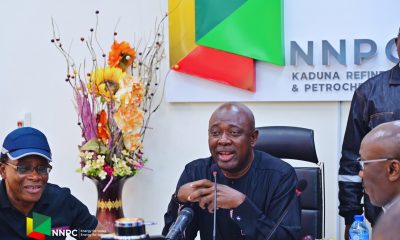Cover
Call for Transparency in NNPC’s Financial Operations Sparks Debate on Corporate Governance and Accountability
Published
8 months agoon

Agnes Ekebuike
Newslens NG reports that the ongoing debate surrounding the financial operations of the Nigerian National Petroleum Corporation (NNPC) has once again brought to light significant concerns regarding corporate governance, transparency, and accountability within the organisation. Amidst mounting allegations of financial discrepancies and the accumulation of substantial debts, experts and stakeholders have voiced their frustrations over the lack of transparency and the need for a more rigorous interrogation of the NNPC’s financial dealings.
Recent revelations that the NNPC admitted to owing $6 billion have triggered widespread concern, prompting calls for an independent audit of the organisation’s financial practices. Critics argue that the lack of transparency in the NNPC’s operations has allowed these debts to accumulate unchecked, raising questions about the effectiveness of the organisation’s internal and external controls.
One of the central issues highlighted in the discourse is the need for transparency in the NNPC’s accounting processes, particularly regarding its importation practices. The fluctuating exchange rate and the fall of the Naira against the dollar have further complicated the situation, making it imperative for the NNPC to disclose its financial dealings openly. The absence of such transparency, according to critics, has led to inconsistencies in the figures presented, thereby eroding public trust in the institution.
Moreover, the debate has extended to the role of external stakeholders, including civil society bodies like ICANN, in holding the NNPC accountable. There is a growing sentiment that these organisations should proactively engage in scrutinizing the NNPC’s operations, rather than waiting to be called upon. Such proactive measures, it is argued, could prevent financial irregularities and ensure that the NNPC operates in the best interest of the Nigerian people.
The issue of corporate governance within the NNPC has also been a focal point of discussion. Critics have pointed out that the cultural and operational inefficiencies within the organisation are deeply rooted and cannot be resolved overnight. They emphasise that while legislation like the Petroleum Industry Act (PIA) is a step in the right direction, the real challenge lies in the implementation and assimilation of such reforms.
In response to these concerns, some stakeholders have proposed listing the NNPC on the stock exchange as a potential solution. However, this suggestion has been met with skepticism, with many arguing that mere changes in ownership or stock exchange listings will not address the underlying issues of operational excellence and corporate governance that plague the NNPC.
As the debate continues, it is clear that a comprehensive and transparent approach is needed to reform the NNPC and restore public confidence in its operations. The Nigerian government, along with external stakeholders, must prioritize corporate governance and accountability to ensure that the NNPC operates effectively and in the best interest of the nation.
You may like

Court Grants Blogger Light Punishment After Plea Bargain in Olukoya Defamation Suit

Remo Secondary School 88/93 Set Honors National President Aare Adetola Emmanuelking with Surprise Birthday Celebration

Supreme Court sets aside N22trn judgement against Union Bank

Sterling Bank Introduces Free Bus Rides for Nigerians

Renewed Hope: Appraising the Transformational Impact of Atiku Bagudu

Analyst, Dan Kunle, under fire over call for private takeover of oil sector

GOV. UZODIMMA COMMISSIONS ZION MINISTRY’S ORPHANAGE, OLD PEOPLE’S HOME

Union Bank’s Edu360 Initiative Fuels Future Stars at Greensprings Football Academy

Union Bank Rewards Customers with Motorcycles, Cash Prizes in 3rd Save and Win Palli Promo 4 Monthly Draw

Adron Homes Celebrate Easter, Offers Up to 30% Discount and Flexible Payment Plan

Emulate Christ’s virtues, Glo urges Christians at Easter

PROPHET ILUKHOLOR TACKLES MBAKA OVER COMMENTS ON EVANG. EBUKA OBI

Senator Gbenga Daniel Celebrates Aare Adetola EmmanuelKing at 50

Nollywood Actor Adekola Tijani Loses Mother Months After Relocating to Canada

Abeokuta North Chairman Dr. Lanre Oyegbola Sodipo Presents 2025 “Budget of Hope and Prosperity” to Legislative Council







